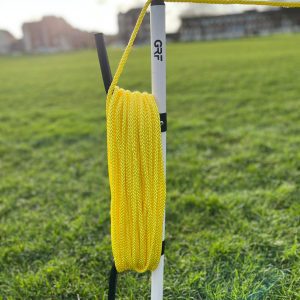Lockdown has impacted on coaches in a variety of ways. Whereas some have welcomed the opportunity for reflection, others are raring to get back out on the grass. Use the tips below to ensure you are staying active, looking after your mental health and connecting with others.
1. Be kind to yourself
Some days you’ll feel better than others and that’s absolutely fine. Try to eat and sleep well, stay active and manage your media and screen time. Avoid putting unnecessary pressure on yourself. Connecting with those you care about, helping others, and focusing on things that you can control are all useful ways of easing the weight we might be carrying on our shoulders.
Click the link below to find information on how you can look after your mental health during this difficult time.
2. Keep a routine
Map out your plan for the day and do your best to stick to it. We tend to be more productive when we are clear on our goals for the day. Prioritise what matters the most and enter these into your schedule first. Ensure you factor in regular meal times, as well as time for yourself. This approach will help break up your daily commitments.
Click the link below to access one of our webinars to help your productivity levels.
3. Reflect on your coaching

Note down some things that you were most proud of from last season. Also consider what things could have been better about your coaching practice and behaviours. Commit to developing one or two things next season.
4. Embrace learning opportunities
There are a variety of different podcasts, articles, documentaries, books and webinars that can help your coaching. Rather than indulging them all, pick out the ones that you feel will be most relevant and beneficial for you. Think about this will link to your reflection and planning.
5. Plan for the season ahead

Based on the above, take the opportunity to speak with your co-coach(es) and agree on some clear and simple messages that you want to focus on next season. These could include values, expectations or how you’ll aim to play.
Click the link below to watch one of our webinars to help plan for when football can start again.
6. Challenge yourself
Try something that you’ve never done before. For example: learn a new skill, set yourself a goal or take up a new hobby. This can be anything from cooking to DIY, increasing your running mileage to chipping a golf ball into a bucket. Share your achievements as you challenge and inspire others to do the same.
Click the link below to watch one of FA Learning’s garden games. Have a go and find out how many you can do.
7. Celebrate virtually
Host a virtual evening where players (and parents for age groups U18) are invited to share a story from this season that has made them feel proud to be part of the team. You’ll no doubt have lots to share too.
Check out The FA’s guidelines for digital communication with players by clicking the link below.
8. Connect with others
Take time to check-in with friends and family on the phone or via video call. If you have instant messaging groups with players and/or parents, set them a challenge or question to have a go at and feedback on. [Remember to the follow The FA’s digital guidelines for communicating with players].
Click the link below to watch FA head of goalkeeping, Tim Dittmer, in conversation with England goalkeeper Freddie Woodman here.
9. Get creative
It has been great to see all the fun ways that people have come up with to entertain themselves and others during lockdown. From converting children’s bedrooms into discos, designing activities in the garden to hosting virtual quizzes and DJ sets there has been creativity on show. How creative have you been?
Click the link below to improve your skills and fitness by using these FA home-practice ideas.
Stay positive and help your players stay positive by signing up to The FAs 21 days of positive HERE
The FA are currently working with Heads Together – a mental health initiative spearheaded by The Royal Foundation of The Duke and Duchess of Cambridge – on the ‘Heads up’ campaign, which aims to raise awareness of mental health in football.
You can read the official ‘Heads up’ guidance notes for managers and coaches working in adult football by clicking here.
Bex Garlick is The FA’s county coach developer for Manchester.
Article courtesy of the FA Bootroom








0 Comments